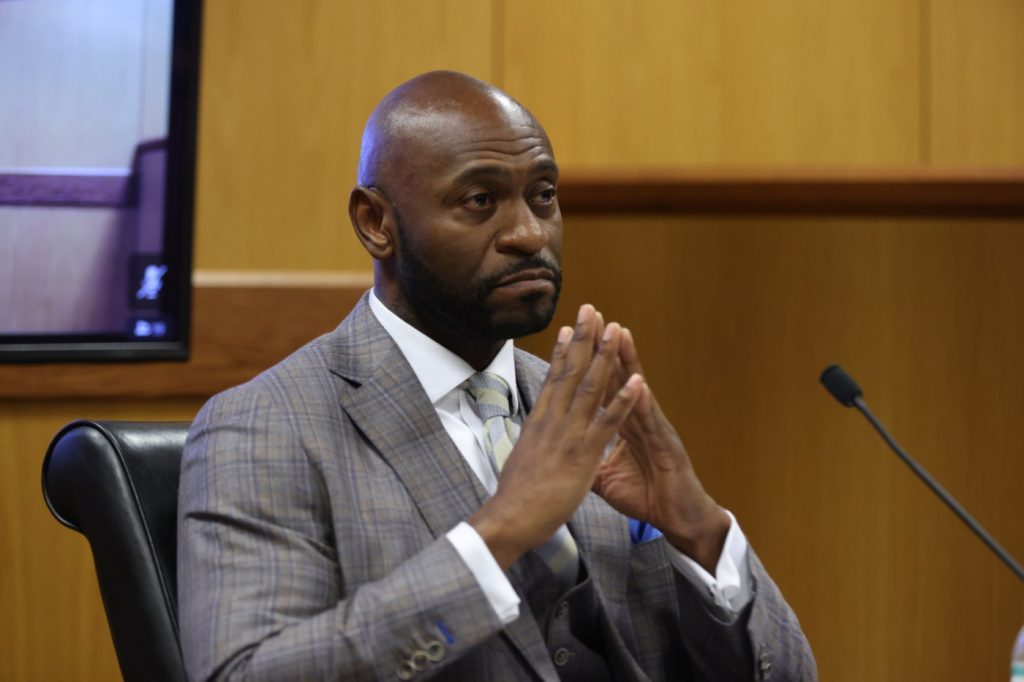By Kate Brumback and Alanna Durkin Richer | Associated Press
ATLANTA — A former friend and co-worker of Fulton County District Attorney Fani Willis testified Thursday that Willis’ romantic relationship with a special prosecutor began before she hired him to lead the election interference case against Donald Trump.
Robin Yeartie’s testimony directly contradicts Willis and Nathan Wade’s statements about their relationship, threatening to upend the case accusing Trump and others of conspiring to overturn the 2020 presidential election results in Georgia.
Ashleigh Merchant, an attorney representing Trump co-defendant Michael Roman, has described the relationship as a conflict of interest that should disqualify Willis — and her entire office — from the case. If that were to happen, a council that supports prosecuting attorneys in Georgia would find a new attorney to take over who could either proceed with the charges against Trump and 14 others or drop the case altogether.
Merchant alleges that Willis personally profited from the case, paying Wade more than $650,000 for his work and then benefiting when Wade used his earnings to pay for vacations the pair took together.
The judge refused to quash a subpoena for Wade and he took the witness stand after Yeartie’s testimony. He insisted that the pair didn’t start dating until after he was hired as special prosecutor in 2022. He also testified that he and Willis traveled together to Belize, Aruba and California and took cruises together, but said Willis paid him back in cash for some travel expenses that he had charged to his credit card.
“She was very emphatic and adamant about this independent, strong woman thing so she demanded that she paid her own way,” Wade said. He said their relationship was not a secret — just private — because they are “private people.”
Willis could also be forced to testify in the hearing, which is expected to stretch into Friday, though her lawyers are fighting to keep her off the witness stand.
Willis’ removal would be a stunning development in the most sprawling of the four criminal cases against Trump. Even if a new lawyer went forward with the case, it would very likely not go to trial before November, when Trump is expected to be the Republican nominee for president. At a separate hearing in New York on Thursday, a judge ruled that Trump’s hush-money criminal case will go ahead as scheduled with jury selection starting on March 25.
In a court filing earlier this month, Willis’ office insisted that she has no financial or personal conflict of interest and that there are no grounds to dismiss the case or to remove her from the prosecution. Her filing called the allegations “salacious” and said they were designed to generate headlines. Wade said in an affidavit filed in court that their relationship began after he was hired and that they have never lived together.
But Yeartie, who worked in the district attorney’s office until early last year, testified that she saw Wade and Willis hugging and kissing prior to November 2021.
Since the allegations of an inappropriate relationship surfaced, Trump has used them to try to cast doubt on the legitimacy of Willis’ case against him. Other Republicans have cited them in calling for investigations into Willis, a Democrat who’s up for reelection this year.
Related Articles
Judge sets March 25 trial date for Trump’s hush-money case
Special Counsel urges SCOTUS to deny Trump’s delay request
Trump in Florida for closed hearing in his classified documents case
Trump asks Supreme Court to put off his election interference trial, claiming immunity
Project Veritas admits claims of Pennsylvania postal election fraud were lies
Yeartie’s testimony began after lengthy sparring between lawyers over who must answer questions in the hearing, which has the potential to dig into uncomfortable details of Willis and Wade’s relationship.
Roman’s lawyer, Merchant, subpoenaed Willis, Wade, seven other employees of the district attorney’s office and others, including Wade’s former business partner, Terrence Bradley. Bradley took the witness stand earlier Thursday but refused to answer questions from Merchant, citing attorney-client privilege.
McAfee said during a hearing Monday that Willis could be disqualified “if evidence is produced demonstrating an actual conflict or the appearance of one.”
He said the issues he wants to explore at the hearing are “whether a relationship existed, whether that relationship was romantic or nonromantic in nature, when it formed and whether it continues.” Those questions are only relevant, he said, “in combination with the question of the existence and extent of any personal benefit conveyed as a result of the relationship.”
Richer reported from Boston. Associated Press writer Adriana Gomez Licon in Miami contributed to this report.


